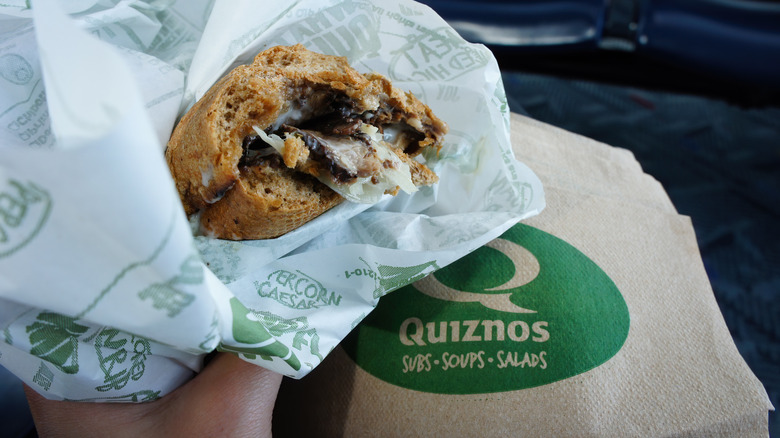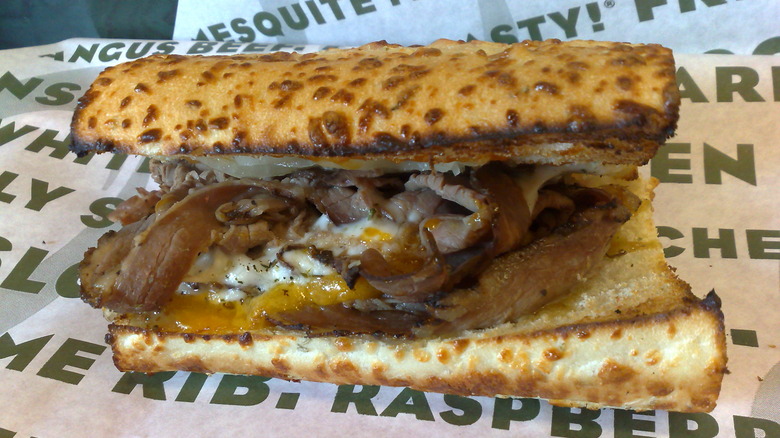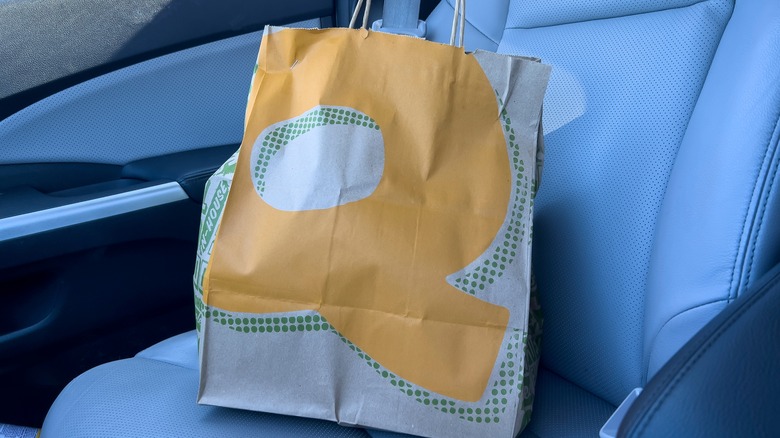What Actually Caused The Downfall Of Quiznos
When it comes to fast food subs in the United States, Subway has long been the boss. But for an extended period during the 1990s and 2000s, Quiznos was hot on its tail, making a name for itself with predominantly toasted submarine sandwiches, including classics like the tuna melt and steak and cheese. At its peak around 2006, Quiznos had about 5,000 restaurants — but by 2024, the chain has all but collapsed, with under 150 locations left in the U.S.
To be fair, Subway has not fared so well in recent years either — its total number of stores also started declining around the mid-2010s for various reasons, from disputes with franchisees to sex offense convictions of its former spokesperson, Jared Fogle. But with over 36,000 restaurants, it's still a huge international chain, while Quiznos is effectively toast.
The reasons are complicated — while it does seem that sub sandwiches have declined in popularity, the reason for Quiznos' precipitous downfall seems to be more about poor management rather than changing tastes. A big issue was that it expanded too fast — its initial decade was tame, starting from one Denver store in 1981, and only growing to 18 by 1991. Then it went public in 1994, and started expanding faster: Franchisees complained that there were too many locations too close together. The stores simply weren't selling that many sandwiches: At the chain's peak, Restaurant Business reports that the average per-restaurant revenue was $400,000 per year, a little over $1,000 per day.
Quiznos' battle with its own restaurant owners
Quiznos' problem wasn't just that it got too big too fast, and had mediocre sales. The company had an antagonistic relationship with its franchise owners, who had difficulty staying afloat due to expenses imposed on them by Quiznos' corporate bosses.
A key issue was that franchisees were obliged to buy their restaurant supplies directly from Quiznos corporate at prices they claimed were inflated, making it impossible to turn decent profits. While a chain fast-food restaurant would normally earn money from its franchisees' royalties (that is, franchisees pay a proportion of their revenue to the company), Quiznos' bosses apparently focused on earning money by selling restaurant supplies to their own franchisees through a company called American Food Distributors — which was a subsidiary of Quiznos itself.
Around 2006, franchisees launched a series of class action lawsuits against Quiznos, accusing the company of racketeering and fraud for the rules it imposed on them regarding where they could buy supplies (among other issues); these were later merged into one lawsuit and resulted in a $206 million settlement in the franchisees' favor. Around the same time, there was a widely-reported case where a Quiznos franchisee took his own life out of anger at the company, further publicizing the problems with its business model.
How Quiznos unraveled from there
Against the backdrop of angry franchisees who weren't turning profits, Quiznos ran into other issues. A private equity firm bought part of the company in a leveraged buyout in 2006 — meaning that the new part-owner, CCMP Capital Advisors, used borrowed money for this transaction. Quiznos was then in a position where it had to turn over bigger profits to pay that back, or be saddled with the debt. Around the same time, Quiznos was struggling to compete with Subway, with Subway adding toasters to its stores in 2005, wiping out one key advantage Quiznos had. To compete, Quiznos corporate issued free sandwich vouchers in 2009. The company forced franchisees to pay for those sandwiches with only limited reimbursement, and some rebelled and refused to accept them. Around the same time, the Great Recession hit, further hurting the company and its franchisees.
Between 2007 and 2012, around 2,000 restaurants closed, and the company basically spiraled from there. It filed for bankruptcy protection in 2014, and while it tried to lure customers with novelties like Quiznos Grill, a fast-casual restaurant in 2015, and remodeled restaurants with drive-thrus and expanded menus, the sandwich chain never recovered. Despite fixing issues like food charges to its franchisees, and seeing growing sales for its few remaining restaurants, it seems unlikely the chain will ever approach its peak of thousands of restaurants again.


